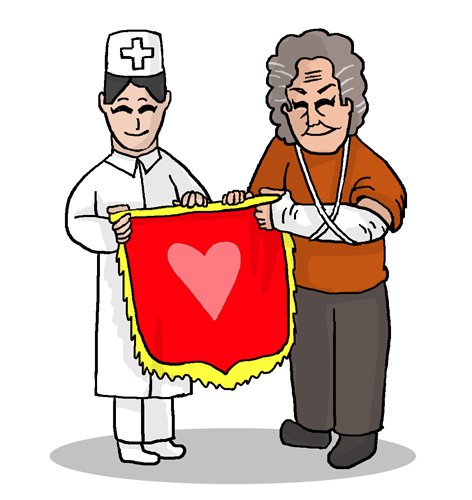
Illustration: Lu Ting/GT
My mother spent four and a half days in a Shanghai hospital last week because of a bone fracture in her left arm, which cost us about 40,000 yuan ($6,061) in fees.
Her doctors implanted imported medical equipment into her arm, which will benefit her the rest of her life. We agreed that she should enjoy a higher quality life in her golden years, as she is only 67, which is still young compared with the average lifespan of people in the Yangtze River Delta (around 80 years).
To be honest, my brother and I were at first a bit hesitant to sign the agreement provided by the hospital saying we must pay a 44,000-yuan deposit. But the doctors provided us with a list of the medical apparatuses that would be used. Every item was tagged with an exact price; this part cost 28,700 yuan.
Meanwhile, my mother, a frugal and hardworking woman from a village in East China's Zhejiang Province, refused to accept this price. She thought her surgery would only cost around 10,000 yuan.
She claimed that she would go back home for cheaper treatment in her hometown hospital, which would be covered by local medical insurance. She argued that people in the past just used plaster to fix bones, so that would be good enough for her, too.
Five other patients and their families sharing our ward shared the same concerns. They were from all parts of China but knew that this hospital was famous for its orthopedics. Some of them had already had their surgery and were being observed. Some were waiting for their surgery and were as nervous as us.
Although we all complained a bit about the high price of surgery in Shanghai, we had to admit that, compared with other provincial hospitals, Shanghai has been doing an exceptional job in preventing corruption, malpractice and bribery among its doctors, nurses and administrators.
Upon checking in, the nurse on duty asked us to sign a promise that we would not offer any hongbao (red envelope stuffed with cash) to any medical staff. Giving money to doctors is a long-standing Chinese tradition in order to receive their preferential treatment. Those patients that don't risk irritating their doctors and, in extreme cases, risk being maliciously hurt by them during surgery.
We couldn't be happier about signing that promise. After all, who would be willing to pay even more money to a hospital in addition to the high expenses we already have to pay out of pocket?
Prior to and after my mother's surgery, the director-level doctor and other assistant medical staff on the team went together to examine and check up on her. But for the rest of the day they are quite busy giving lectures on campus or treating patients at the out-patient department. Even if we wanted to bribe them, we wouldn't have been able to find them.
I must say that, undoubtedly, Shanghai has done great work in improving trust between patients and doctors. Previously, in addition to the stress and suffering that their illness or injury was causing them, Chinese patients and their families also had to worry about how much money they have to bribe their doctors and nurses with.
For example, when my father was seeking treatment at another Shanghai hospital five years ago before he finally passed away that summer, my family and I were not discouraged from offering hongbao to his doctors.
In fact, his director-level doctor accepted all the gifts and cash that we handed over to him without saying no and without even saying thank you. He put it right into his pocket as a matter of course, having been spoiled and corrupted by that outdated custom.
Today, that fear has been eliminated thanks to the strong efforts of our central and local governments to "confine tigers and mosquitoes."
Patients (at least in Shanghai) need not complain about the high price of hospitalization since they now will know exactly where their money is going thanks to the itemized receipt they will receive upon their discharge.
As for my mother, she now has a new 40,000 yuan arm that will probably outlast her.
The opinions expressed in this article are the author's own and do not necessarily reflect the views of the Global Times.

